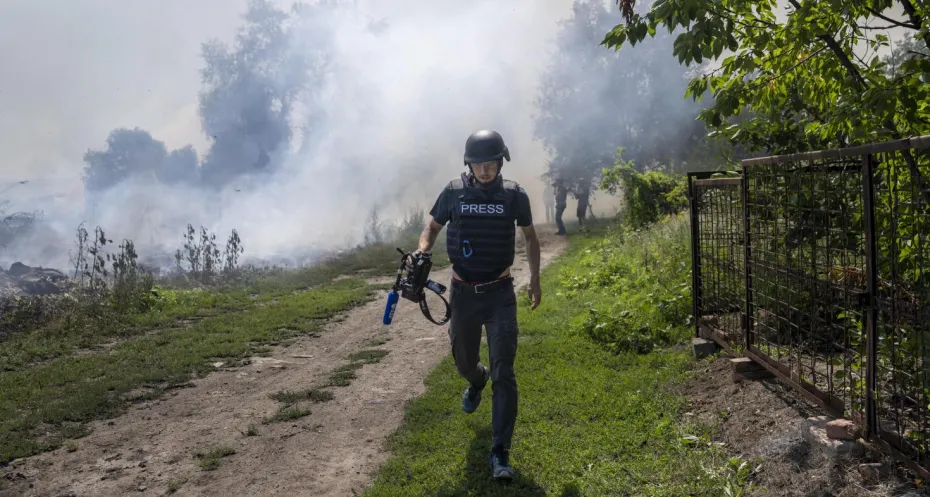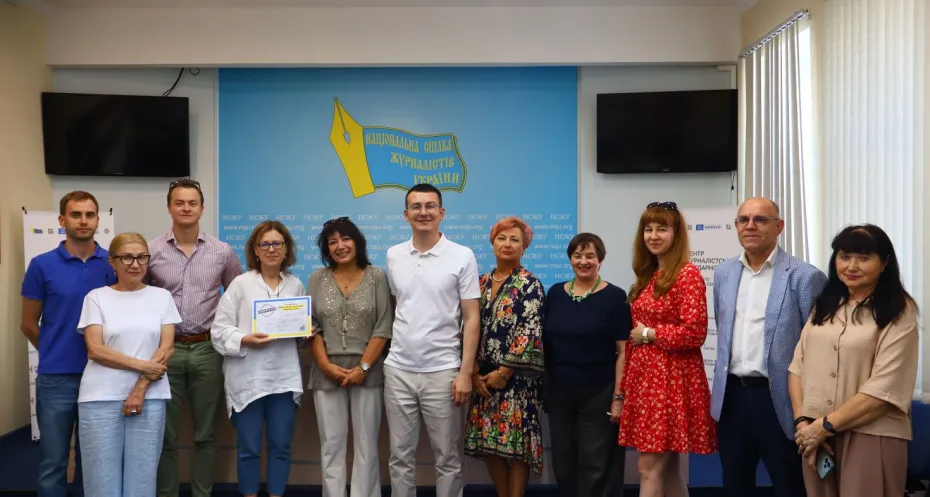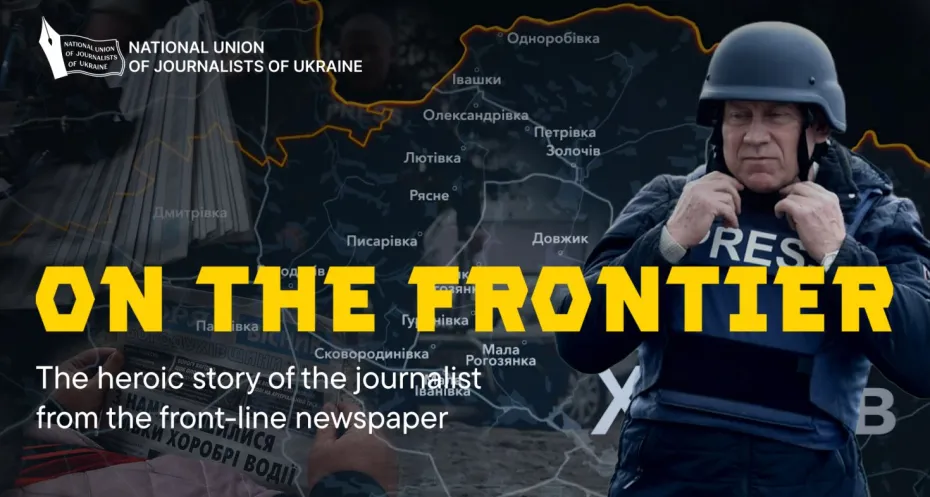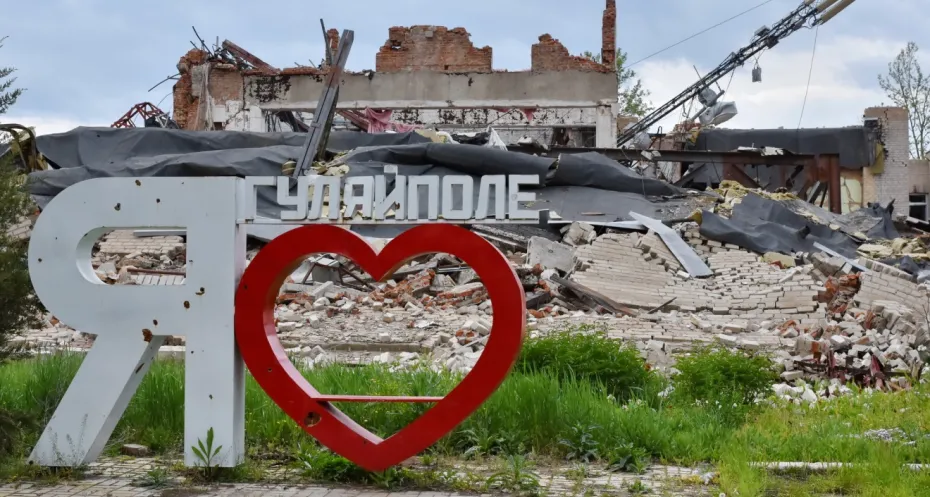As Russian forces push ahead, independent media in Ukraine continue to report

Almost one year following Russia’s invasion of Ukraine, and the Ukrainian people remain as strong and resilient as ever before. This includes journalists, who continue to show their perseverance, reporting from the front lines, while others are writing from abroad. Through our Media Lifeline Ukraine initiative, we have been supporting journalists in and around Ukraine to maintain the free flow of information in the region.
Free Press Unlimited initiated Media Lifeline Ukraine one week after the Russian invasion started. 30 organisations have joined the initiative so far. In the early stages of the war, our focus was mainly on providing emergency support, evacuating journalists and media professionals that were located in regions controlled by Russian and pro-separatist forces. Since then, the support has shifted more towards supporting journalists and media to adapt and continue reporting under new and increasingly difficult circumstances.
For this, we provided journalists with the necessary resources such as financial living support for freelancers, reporting equipment including laptops, first aid kits, ballistic vests and helmets, powerbanks, and VPNs. These efforts were coordinated with our sister organisation Free Press for Eastern Europe, and the local team of Reporters Without Borders (RSF) through our joint initiative, the Lviv Press Freedom Centre.
Continued threats
Journalists in Ukraine experience ongoing threats to their physical and psycho-social security, and face heightened levels of risk given their close proximity to the front lines. Journalists continue to get caught under fire, shelling, and bombings while providing global audiences with reliable news about the war. In addition, we witnessed targeted attacks against media professionals because of their work, especially for journalists working in Russian occupied-territories. Journalists who are based in these regions and are critical in their coverage about the Russian government, face severe legal harassment and physical attacks
Emergency support
Since the invasion, we were able to support nearly 1,000 Ukrainian journalists. Now that targeted bombing of infrastructure and energy centers result in the absence of electricity, heating and connectivity for millions, more journalists are relocating to Europe. For much needed rest and respite, but also to be able to continue their work.
In order to protect journalists in Ukraine as much as we can, we transported 150 ballistic vests and 401 safety kits containing first aid materials to Ukraine, despite the many logistical challenges. To help journalists effectively use protection equipment, we developed a short manual in Ukrainian language on how to use and take care of ballistic vests. To learn how to use these first aid kits, we coordinated efforts with the ACOS Alliance to organise trainings. Besides this, we supported 47 journalists with digital safety assets, for example by distributing high-quality VPN codes to make sure they have safe connections to work with.
Media hub in Poland
Poland continues to be one of the major destinations in terms of relocation for Ukrainians. Our Warsaw media hub, originally set up for Belarusian journalists with our partner Belarus in Focus Information Office, is now also a place of refuge for Ukrainian journalists who want to continue to work from abroad. Through this hub, we are setting up a system of housing, stipends and production support for Ukrainian journalists.
Free Press for Eastern Europe contracted one producer for the Warsaw media hub, and selected five journalists to receive stipends. With these stipends, they can produce content for Ukrainian media outlets. Because these journalists mainly had experience in TV productions, we provided them with four trainings on the creation of social-media friendly content, including visuals. The team’s operations was also supported by the provision of six laptops. Now, the all-female led team (due to the limitations on leaving the country for males aged 18-65) has produced 15 stories for three leading independent Ukrainian outlets. In addition, 13 journalists who arrived in Poland were supported with housing via stipends.
Next steps
Free Press Unlimited will continue to assist journalists in and around Ukraine with emergency and living support. Free Press for Eastern Europe will mainly focus on developing contacts with more media outlets in Ukraine to help maintain the free flow of reliable information, and to grow the capacities and support of the team of journalists in Warsaw. This also includes continued coaching, for example in establishing safe and rapid ways of online communication, and introducing the team to several Polish journalists and media in order to establish peer-to-peer contacts and overcome Ukrainian journalists’ isolation.
The shelling of electricity infrastructure by Russia has made the services of the Warsaw-based production team even more relevant for the Ukraine-based outlets, that now have problems with access to internet. They need extra pairs of hands to edit stories, provide comments, film interviews, and more. Due to issues with water and heating access, more journalists are likely to look for temporary refuge in Poland until spring 2023. We will continue to support them as much as possible.
Update 21 February:
Independent media still operating in Ukraine
have to deal with regular blackouts and power
outages due to bombings. Through Media Lifeline
Ukraine’s financial support, one of our partners
purchased 5 charging stations with 500 to 1500
Watts of power. They now have an autonomous
power source in every office room, and journalists
can still work, upload content and report, even during
blackouts. Through one such station, our partner can
ensure the work of up to 10 journalists for up to 5 hours
and through new, updated batteries they have up to 9
hours of lighting. Now even during power outages,
they have access to the CRM server and are able
to use wireless internet. This allows film crews to
still upload videos and have access to archived
photo and video archives.



